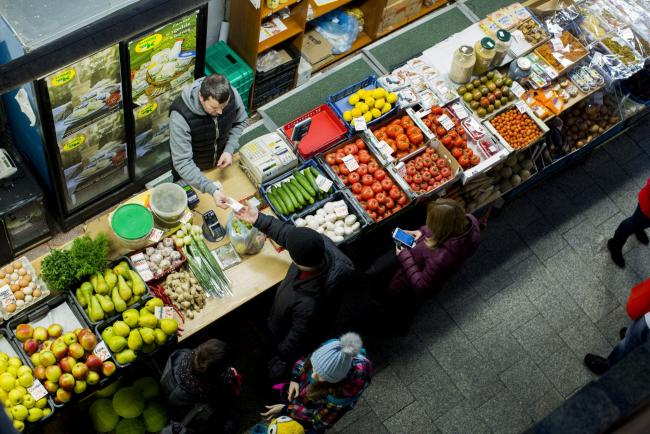(Bloomberg) -- Poland’s central bank is adamant that this year’s steep pickup in inflation is nothing to worry about.
Yes, price growth will quicken more, admits Governor Adam Glapinski. But after it’s expected to hit 3% this year and near 3.5% in early 2020, it will start to ease in about 12 months’ time, he says. That’s enough, the policy maker said, to maintain interest rates at the record-low level they’ve been at since 2015.
There are grounds to believe him. The world’s major central banks are leaning toward looser monetary policy as the global economy loses steam -- a factor that will restrain Polish inflation. The zloty strengthened to a 14-month high against the euro in July, reducing the prices of imports.
But, equally, there are reasons to question whether Glapinski’s narrative is overly optimistic. Here are some.
1. Booming wages
An influx of workers from neighboring Ukraine has for years offset labor shortages, helping keep salaries -- and inflation -- in check. But looser rules in Germany could lure away a quarter of the country’s Ukrainian workforce in the next four years, according to a central bank study published last month. Unemployment, meanwhile, remains near a record low.
2. Tax shake-up
Levies on Poland’s biggest retailers and providers of telecommunications services are expected to be shifted to customers. That will boost services prices, which have been the second-biggest driver of inflation of late. Furthermore, there’s evidence of the end of cut-throat competition among telecoms as well as banks, which have been increasing fees. This bodes well for their shareholders but worse for consumers, who can expect higher prices if price competition declines.
3. Food costs
Price for everyday items from pork to potatoes have rocketed. The gains may not be over as hot, dry weather threatens this year’s harvest and global meat prices rise. That’s putting the squeeze on low-income households, where food makes up a bigger share of budgets. Such families may be experiencing inflation that’s 0.6 percentage point higher on average, according to recent central-bank data.
4. Energy market
An inflation threat that failed to materialize this year, energy costs haven’t disappeared as a risk factor. Prices for medium-sized and large companies will be deregulated in 2020, meaning greater fluctuations. There’s no decision yet on costs for consumers, which were frozen by the government for 2019, giving the central bank a helping hand.
5. Closing the regional gap
Poland’s economy has been the envy of its neighbors in recent years, boasting stellar expansion alongside benign inflation that’s allowed the central bank to maintain loose monetary policy. That era is drawing to a close. Looking around eastern Europe, Poland’s belated inflation spurt -- the European Union’s fastest acceleration this year -- could have further to run. Within the region, only Polish inflation will quicken next year, according to the European Commission.
None of these threats ruffles the central bank. Piotr Szpunar, who’s responsible for staff projections, says downside risks pose a greater danger to his forecasts.
Not everyone’s convinced.
“We see inflation approaching 4% at the start of 2020,” economists at Santander (MC:SAN) Bank Polska SA wrote. “But even in our price-growth scenario, it seems very unlikely that the MPC will decide to tighten monetary policy before the end of that year.”
